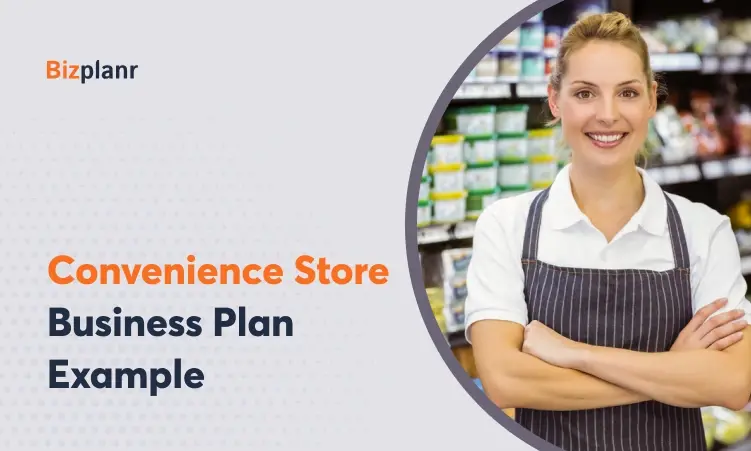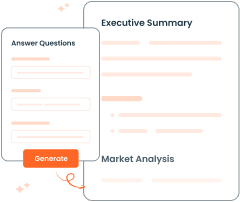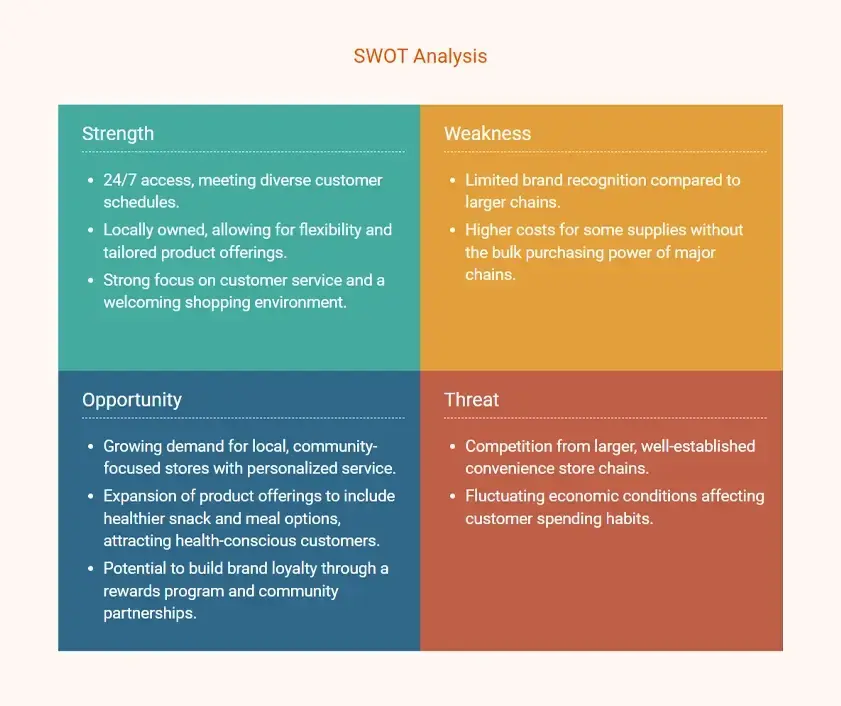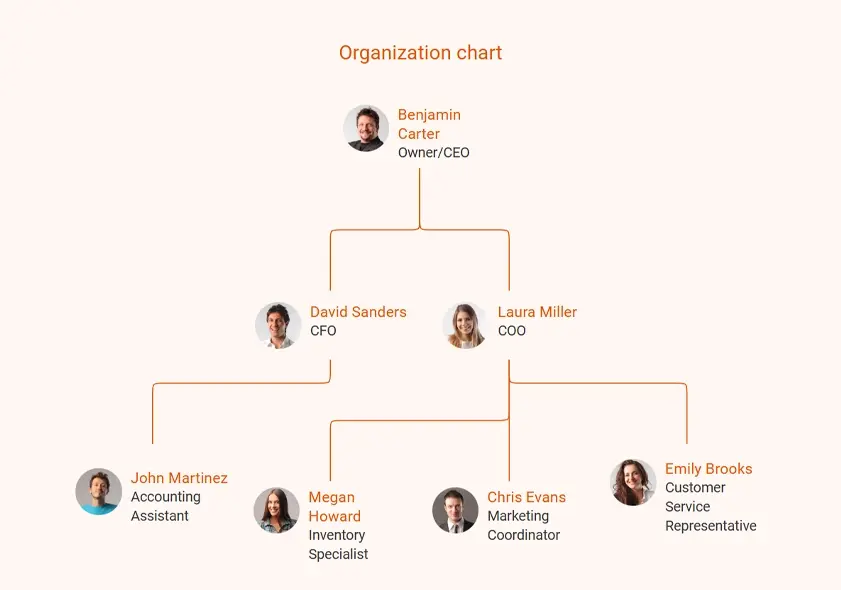Establishing your own convenience store can be a lucrative venture as more and more people look for quick and easy-access stores to grab their everyday essentials. Whether it’s groceries, snacks, or household supplies!
But before you start, you’ll need a well-thought-out business plan that reflects your unique idea, attracts investors, and sets you apart in the market.
Wondering how to draft your plan?
Not to worry! This convenience store business plan example and a free template is for your help and inspiration right away.
Convenience store business plan example
Well, here’s a thriving convenience store—QuickMart Express that achieves its business goals and delivers exceptional service through an effective business plan.
Let’s take a closer look at its sample plan and get practical insights on how to structure your own.
1. Executive summary
QuickMart Express is a 24/7, prominent convenience store located at 312 Westfield Avenue, Chicago, IL. It’s committed to making life easier for the local community.
Founded by Benjamin Carter, QuickMart Express is all about providing a reliable spot for everyday essentials, quick snacks, and extra services. We’re here for neighborhood residents, office workers, students, and commuters, making it simple to grab what they need anytime—day or night.
Vision
We want QuickMart Express to be Chicago’s go-to convenience store, known for quality products, friendly service, and supporting what the community needs. Our vision is to become a trusted part of the neighborhood, always adapting to meet local demands and making city life a little easier.
Mission statement
Our mission is to make shopping quick and reliable for our local community. We, at QuickMart Express, offer essential products with exceptional customer service and experience. We’re dedicated to meeting all the needs and preferences of our customers.
Market Opportunity
We serve a broad customer base within the local community. We primarily target a busy, urban demographic that values a quick, convenient place to grab essentials. The store’s location and 24/7 availability position it to capture a steady flow of customers seeking an easy shopping experience.
Key offerings
At QuickMart Express, we offer a carefully selected range of products, including:
- Groceries
- Snacks and beverages
- Household supplies,
- Health and beauty care products
Plus, we provide extra services like lottery tickets and bill payment conveniences to make QuickMart Express a truly go-to spot for the community.
Marketing efforts
We’re going to employ a local marketing approach, like distributing flyers or coupons to nearby people and using social media for promotions. We also partner with local vendors to promote regional products, enhancing its appeal.
Financial highlights
We, at QuickMart Express, aim to reach $240,000 in revenue in our first year of operation. We expect to grow our revenue to $360,000 by the end of year three. With steady sales and smart cost management, we’ll be profitable within the first year.
| Metric | Year 1 ($) | Year 2 ($) | Year 3 ($) |
|---|---|---|---|
| Revenue | 240,000 | 300,000 | 360,000 |
| Gross Profit | 96,000 | 120,000 | 144,000 |
| Operating Expenses | 80,000 | 85,000 | 90,000 |
| Net Profit (Pre-Tax) | 16,000 | 35,000 | 54,000 |
To get started, we’re seeking $150,000 in funding to cover startup costs like leasing, inventory, equipment, marketing, and working capital.
Liking the plan you're reading? It's AI generated.
Generate Your Own Using Bizplanr AI
2. Business Overview
Founded by Benjamin Carter, QuickMart Express is an LLC structured convenience store, designed to be the go-to spot for everyday essentials. It’s situated right at 312 Westfield Avenue in Chicago, IL. It's a prime location with plenty of foot traffic from locals, office workers, and commuters.
QuickMart Express is all about convenience, quality, and friendly service, making it a reliable, one-stop shop for groceries, household items, snacks, and personal care products. Additionally, we offer handy services like bill payments, prepaid cards, and a loyalty program, enhancing its appeal as a neighborhood hub.
Core values
- We put our customers first, creating a friendly, welcoming space with fast and helpful service.
- We actively support the local community while offering products and services that match what nearby residents and workers want.
- We operate with honesty, transparency, and dependability. So, customers can trust us to consistently meet their needs.
Background history
The concept for QuickMart Express was born out of founder Benjamin Carter's observation of a gap in the local market for a convenience store that was truly community-centered.
After working in retail management for several years, Benjamin saw the potential for a store that could cater specifically to the diverse needs of busy urban residents, especially those requiring flexible hours and a reliable source for last-minute essentials.
Driven by the idea of creating a store that goes beyond just meeting daily needs, Benjamin Carter envisioned QuickMart Express as a spot where the community can count on convenience and feel welcomed.
Short-term goals
- Establish brand recognition and build a loyal customer base within the first six months via targeted marketing and outreach efforts.
- Aim to break even within the first year by controlling costs, implementing competitive pricing, and optimizing inventory.
- Increase customer retention rates within the first three months by launching a loyalty program that rewards frequent patrons.
Long-term objectives
- Want to grow our local customer base through personalized services, consistent community engagement, enhanced services, and extra product offerings.
- If successful, we’ll expand our business model to other locations in Chicago and build a small network of community-centered convenience stores.
- Create and maintain strong connections with local vendors, residents, or community organizations to make QuickMart a reliable resource.
3. Industry and market analysis
Industry Overview
The U.S. convenience store industry plays a significant role in the retail world, with over 49,000 stores spread across the country. The industry generates more than $45 billion in revenue, catering to customers' demand for fast, accessible shopping.
In busy cities like Chicago, convenience stores are essential retail spaces, offering everything from snacks and beverages to basic groceries and household items.
Target market
QuickMart Express targets a broad customer base in its area. Here’s a breakdown of our potential customer segments looking for quick, easy access to essential items:
| Target Market Segment | Description | Primary Needs | Shopping Behavior |
|---|---|---|---|
| Local Residents | Families, young professionals, and retirees who live nearby | Essentials like groceries, snacks, household items | Regular, weekly visits for essentials |
| Office Workers | Employees from nearby offices looking for quick snacks and supplies | Quick snacks, beverages, grab-and-go meals | Frequent, short visits during breaks |
| Commuters | People passing through, especially during peak hours | Convenience items, drinks, quick snacks | Impulse buys, typically morning and evening |
| Students | College or high school students in the area | Affordable snacks, beverages, school supplies | Frequent visits, value-oriented |
| Late-Night Shoppers | Night shift workers or people with late schedules | 24/7 availability, essentials, ready-to-eat options | Late-night visits, often convenience-driven |
Competitor analysis
QuickMart Express faces strong competition from both large chains and local independent convenience stores. Here’s a quick look:
1. 7-Eleven
With over 9,000 locations across the U.S., 7-Eleven is a major player in the convenience store industry. It’s well-known for its wide product range and consistency across locations.
Strengths:
- Nationwide brand with a loyal customer base
- Strong loyalty program (7Rewards)
- Standardized product and service offerings
Weaknesses:
- Limited ability to adjust products to specific neighborhoods
- Leading to a less personal experience.
2. Speedway
Primarily located in the Midwest, Speedway combines convenience retail with fuel services. It’s popular among commuters and fuel shoppers.
Strengths:
- Located in high-traffic locations, making it convenient for commuters
- A robust loyalty program called Speedy Rewards encourages return visits
Weaknesses:
- More focus on fuel than retail, with a less comprehensive product selection
- Less emphasis on community engagement
3. Circle K
Circle K is also a prominent convenience store chain. It’s known for its broad product range (like snacks, beverages, fresh foods, and a line of private-label items).
Strengths:
- Extensive inventory with fresh and hot food options
- Frequent discounts on beverages
- Prime locations in urban areas
Weaknesses:
- Doesn’t always meet local preferences
- Customer interactions tend to feel transactional
SWOT analysis
4. Products & service offerings
At QuickMart Express, we’re all about making life easier for our community. We bring together essential products and convenient services under one roof, focusing on variety and accessibility to meet the needs of locals, commuters, and students.
Product offerings
- Groceries—milk, canned goods, frozen foods, and pantry staples
- Snacks and beverages like chips, candy, energy drinks, and coffee
- Household supplies, from cleaning products to paper towels and trash bags
Extra services
- Lottery tickets and prepaid mobile cards
- Bill payment services without making multiple stops
Unique Selling Points (USPs)
- We’re open 24/7, so customers can shop whenever it’s convenient for them, whether it’s late at night or early in the morning.
- We select our products based on what’s popular and needed in the neighborhood. This makes our inventory feel relevant and familiar to our local community.
- With a mix of essentials, snacks, household items, and additional services, we make it easier for customers to get everything they need in one quick stop.
5. Marketing and sales strategy
Our marketing and sales strategy focuses on building customer loyalty while connecting with the local community. We’ll use local outreach, personalized service, effective promotions, and digital visibility to attract and retain customers.
Marketing Plan
- We’ll distribute promotional flyers and coupons to nearby residents, local businesses, and community centers to make people aware of our offerings.
- We’re planning to utilize active social media platforms (Facebook, Instagram) to share what’s happening at our store—regular updates, promotions, and special deals.
- We’ll introduce loyalty programs to reward repeat customers for frequent visits. This can help establish strong relationships.
- We’ll run in-store promotions (special discounts or limited-time offers) to drive impulse purchases of popular items, such as snacks and beverages, boosting daily sales.
- By collaborating with local vendors, we’re going to feature special regional products that resonate with our community and strengthen QuickMart’s local appeal.
Sales strategy
- We aim to keep a competitive pricing strategy, especially for high-demand items. This will make QuickMart Express an affordable option, bringing in budget-conscious customers.
- Our store layout is designed in such a way that makes shopping quick and easy, with clear signage, a clean environment, and efficient checkout.
6. Management team
QuickMart Express’s management team is designed to support the store’s goals and provide top-notch customer service. Here’s an overview of our key team members, along with their roles & responsibilities:
Key managers
Benjamin Carter: Owner/CEO
Benjamin Carter, the founder and CEO of QuickMart Express, sets the vision and strategy for the store. With years of retail experience and a real commitment to the community, Benjamin focuses on growing the store, maintaining quality, and keeping customers happy.
Laura Miller: COO
Laura Miller, our Manager and COO, keeps daily operations running smoothly. With a strong background in retail and team management, she makes sure the store stays organized and that we deliver top-notch service every day.
David Sanders: CFO
David Sanders, our Accountant and CFO, takes care of the store’s finances, making sure everything is on track. From budgeting to managing cash flow, David’s role is key in keeping QuickMart Express profitable and running strong.
Advisory Board members
As we grow, we might bring in an advisory board for extra guidance. This team would provide guidance to stay on the right path. Potential members could include:
Nancy Green: Retail operations expert
Nancy Green has 20+ years of experience in the retail industry. She brings valuable insights into inventory and staffing as well as ensures great customer service.
Robert Chen: Financial advisor
Robert Chen is a seasoned finance expert for growing small businesses. He could offer guidance on budgeting, cash flow, and planning for the future.
7. Operations plan
Our operations plan for QuickMart Express involves all the day-to-day processes and key elements to keep the store running smoothly and effectively. This will ensure our customers can have a great experience every time they walk in.
Daily operations
QuickMart Express operates 24/7, catering to customers with different schedules. Staff shifts are structured to maintain service quality around the clock, with extra support during peak hours (early mornings, lunch, and late evenings).
Plus, we’ve got a checklist for cleanliness and safety each day. We maintain regular cleaning schedules and frequently sanitize high-contact areas. Staff also follow health protocols to keep the store safe and hygienic.
Store layout
We organize our store in such a way that it’s easy to navigate, with clear sections for groceries, snacks, drinks, health and beauty items, and household supplies. This emphasizes the visibility and convenience to help customers quickly find what they need.
Inventory management
We’ve kept a thoughtful selection of all the essential items, like groceries, household supplies, snacks, and drinks, based on what our customers actually want. Our POS system lets us track inventory levels and reorder items when needed.
Staffing needs & training
QuickMart Express requires a small, dedicated team to ensure smooth operations and quality service. Key positions include store manager, sales Associates, assistant manager (if any).
All employees undergo initial training focused on customer service, POS system operation, store layout, and core values.
8. Financial Plan
The financial plan for QuickMart Express clearly outlines projected revenue, operating costs, and profitability over the first three years. These projections are based on expected sales growth as the store establishes itself within the local community.
Profit and loss statement
| Item | Year 1 ($) | Year 2 ($) | Year 3 ($) |
|---|---|---|---|
| Revenue | 240,000 | 300,000 | 360,000 |
| Cost of Goods Sold (COGS) | 144,000 | 180,000 | 216,000 |
| Gross Profit | 96,000 | 120,000 | 144,000 |
| Operating Expenses: | |||
| - Rent and Utilities | 30,000 | 31,500 | 33,075 |
| - Salaries and Wages | 80,000 | 84,000 | 88,200 |
| - Marketing and Advertising | 15,000 | 15,750 | 16,538 |
| - Inventory Management and Supplies | 10,000 | 10,500 | 11,025 |
| - Miscellaneous Expenses | 5,000 | 5,250 | 5,513 |
| Total Operating Expenses | 80,000 | 85,000 | 90,000 |
| Operating Profit | 16,000 | 35,000 | 54,000 |
| Depreciation Expense | 5,000 | 5,000 | 5,000 |
| Net Profit Before Tax | 11,000 | 30,000 | 49,000 |
| Tax Expense (25%) | 2,750 | 7,500 | 12,250 |
| Net Profit | 8,250 | 22,500 | 36,750 |
Cash flow estimates
| Item | Year 1 ($) | Year 2 ($) | Year 3 ($) |
|---|---|---|---|
| Net Profit (Pre-Tax) | 11,000 | 30,000 | 49,000 |
| Depreciation & Amortization | 5,000 | 5,000 | 5,000 |
| Working Capital Adjustments | -5,000 | -2,000 | -1,000 |
| Cash Flow from Operations | 16,000 | 33,000 | 53,000 |
| Capital Expenditures: | |||
| - Store Fixtures | -20,000 | -7,000 | -3,000 |
| - Technology & POS | -10,000 | -3,000 | -2,000 |
| Total Capital Expenditures | -30,000 | -10,000 | -5,000 |
| Net Cash Flow | -14,000 | 23,000 | 48,000 |
Balance sheet
| Item | Year 1 ($) | Year 2 ($) | Year 3 ($) |
|---|---|---|---|
| Assets: | |||
| - Current Assets | 80,000 | 98,000 | 110,000 |
| - Cash | 20,000 | 30,000 | 35,000 |
| - Inventory | 60,000 | 68,000 | 75,000 |
| - Non-Current Assets | 70,000 | 80,000 | 98,000 |
| - Store Equipment | 30,000 | 35,000 | 45,000 |
| - Fixtures and Furnishings | 40,000 | 45,000 | 53,000 |
| Total Assets | 150,000 | 178,000 | 208,000 |
| Liabilities: | |||
| - Current Liabilities | 50,000 | 40,000 | 30,000 |
| - Accounts Payable | 25,000 | 20,000 | 15,000 |
| - Short-Term Loan | 25,000 | 20,000 | 15,000 |
| Total Liabilities | 50,000 | 40,000 | 30,000 |
| Owner’s Equity | 100,000 | 138,000 | 178,000 |
| Total Liabilities and Equity | 150,000 | 178,000 | 208,000 |
Funding requirements
QuickMart Express is currently seeking $150,000 in initial funding, which will be used to cover essential startup costs:
| Item | Amount Needed ($) | Purpose |
|---|---|---|
| Lease and Initial Deposits | 30,000 | To secure store location and cover first months of rent |
| Inventory Purchase | 40,000 | To stock initial product inventory |
| Store Furnishings and Equipment | 35,000 | For shelving, refrigeration units, counters, and POS systems |
| Marketing and Promotion | 15,000 | For initial marketing outreach and loyalty program |
| Working Capital | 30,000 | For daily expenses and unforeseen costs during first six months |
Potential sources include a bank loan, investment from an external investor, or owner equity. If a loan is obtained, QuickMart aims to begin repayment within the first year, utilizing cash flow from operations.
Download our convenience store business plan template
So, are you all set to prepare your convenience store business plan? But need more assistance with that? Not to worry! Download our free convenience store business plan template in PDF and get started.
This investor-friendly template has helped thousands of entrepreneurs start their retail businesses successfully. I hope it helps you as well. With its real-life examples and insights, you can easily reflect on your unique vision and draft a solid plan.
Conclusion
With this convenience store business plan sample, you’ve now got a better understanding of how to write a professional-looking plan.
But if you’re still confused or looking for an easy way to create a comprehensive business plan, Bizplanr could be your go-to tool. It’s an advanced AI business plan generator that writes actionable plans quickly and efficiently.
Just answer a few simple questions regarding your business idea, and get a detailed plan ready in minutes!
Get Your Business Plan Ready In Minutes
Answer a few questions, and AI will generate a detailed business plan.
Frequently Asked Questions
Why is a business plan important for a convenience store?
A business plan is very important for a convenience store as it helps you organize your ideas and consider every aspect of your business. Also, it lets you summarize your goals, target audience, marketing efforts, business operations, as well as financial projections.
Plus, if you want to draw in investors' attention or secure loans, keeping a solid plan shows that you’re serious and ready to make it a success.
How can I forecast sales for a convenience store business plan?
While forecasting sales for a convenience store, you have to think about: your store’s location, target market size, foot traffic, and potential customer demand.
Start by estimating how much you expect to make (average sales) per day and multiply that by the days you’ll be open each month. Explore similar stores in your area to get a rough idea about industry benchmarks and data. And lastly, make sure you keep your estimates a bit conservative, especially for the first year while you’re building up regular customers.
How long does it take to prepare a convenience store business plan?
Typically, it might take anywhere from a few days to a few weeks depending on the amount of research and the level of details required. If you’re doing it by yourself and digging into thorough market research, supplier information, and financial details, it may take several weeks.
However, using ready-made templates or business planning software can help you speed up the process and offer a clear structure to follow.
How can I get funding for my convenience store business?
If you need funding for your convenience store business, explore several options:
- Traditional bank loans
- Small Business Administration (SBA) loans
- Private investors
- Crowdfunding platforms
- Government grants








